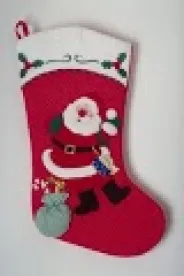‘Twas the night before Christmas and all through the house, not a creature was stirring, not even a mouse. The stockings were hung by the chimney with care, but who would have guessed, that counterfeits were there?
Two weeks before the holidays and I’m reluctant to interrupt the visions of sugar-plums dancing in your heads with a cautionary tale, but during this year’s shopping season we all need to be reminded to remain on our guard…against counterfeits. This reminder is not for the squeamish. Some of the facts are not pretty, but they could save your life, or at least your wallet.
If you’ve ever purchased a counterfeit designer perfume, did you know that bottle could contain cat urine? Unfortunately, don’t think about returning it, you’ll find that the seller is nowhere to be found and you’ve wasted your money. Did you know the purchase of knock-off luxury purses, could be funding terrorists? You may not be aware you’ve purchased a counterfeit or, if you are, you may think that by buying counterfeit products you are simply saving money or, at worst, perhaps slighting some already well-to-do company from a little less profit this year. Wrong.
Counterfeiting is now a multi-billion dollar, yes multi-billion dollar, criminal industry that hurts economies due to massive losses of tax revenue, has been linked to the funding of organized crime, costs people their jobs (over two million jobs a year are lost due to counterfeiting), and can even cost lives. It is not only luxury items that are counterfeited. Anything can be counterfeited. Common counterfeits include products such as medicine, food, cosmetics, electronics and automotive parts (including safety products such as brake pads and airbags) which are not tested properly, are often not well made, and can be dangerous.
Trademarks are intended, in part, to create dependability for the consumer. When you order a McDonald’s cheeseburger, you know what to expect. Trademarks are supposed to allow consumers to rest assured that a product they buy under a certain trademark will be of the same quality they have come to expect. This dependability also helps brand owners develop goodwill in their name and creates an incentive for them to create quality products. Counterfeits destroy this dependability by allowing inferior products to masquerade as the original.
What brand owners and the authorities are doing-
If you are a brand owner and you own a trademark that has been registered with the U.S. Patent and Trademark Office, you can record your mark with U.S. Customs and Border Protection (CBD), part of the U.S. Department of Homeland Security. Customs officials keep these marks in a database and are authorized to seize imports that appear to be counterfeits, upon entry into the country. They then notify the brand owner of the seizure. Owning a federal registration for a trademark is also a prerequisite for trademark owners to be entitled to certain legal advantages, such as obtaining statutory damages for infringement of their mark, pursuant to Section 35 of the Lanham Act.
Recently, the U.S. Immigration and Customs Enforcement’s (ICE) Homeland Security Investigations (HIS), together with law enforcement agencies around the world, seized 132 domain names as part of a “Cyber Monday” sting, because those domain names were being used in connection with sites selling counterfeit products. During this time of year with its increased consumer spending, comes increased opportunities for counterfeiters, and more work for law enforcement. To read more about this story and other recent counterfeit-related seizures and arrests go to www.iprcenter.gov/news-releases.
What you can do-
The key to keeping counterfeits out of your shopping cart is education and enforcement. To read additional interesting facts about counterfeit products, their impact, and how to identify them, go to www.unrealcampaign.com. The Unreal Campaign is sponsored by the International Trademark Association and is dedicated to educating the public, in particular, educating and raising awareness among teenagers about the harms of counterfeits. If you’re a consumer who wants to report a counterfeited or pirated product, or otherwise report a violation of intellectual property rights, you can submit a report at www.iprcenter.gov/referral.
So this holiday season, as you are checking off your gift list and joining the masses shopping online and in the malls, please remember to check the products, the brand names and logos, and the websites carefully before purchasing! If you notice that the brand names or other parts of the packaging don’t look quite right, they probably aren’t. In addition, shopping at reputable retailers, rather than discount sites, will also help you avoid cheaply made and potentially dangerous counterfeits, that can’t be returned. And remember, if the price seems too good to be true, it probably is.
Happy Holidays and Careful Shopping!




 />i
/>i

